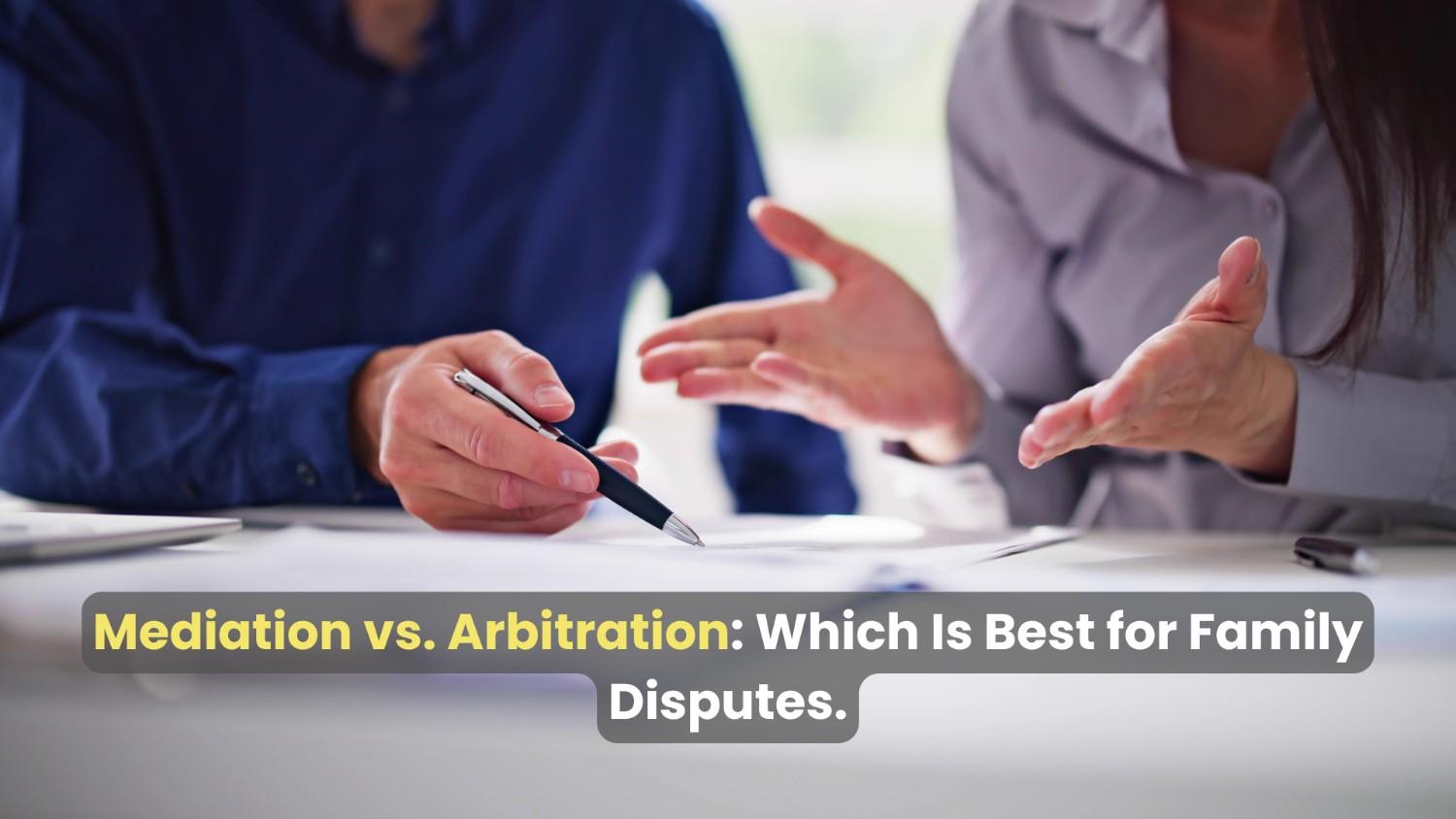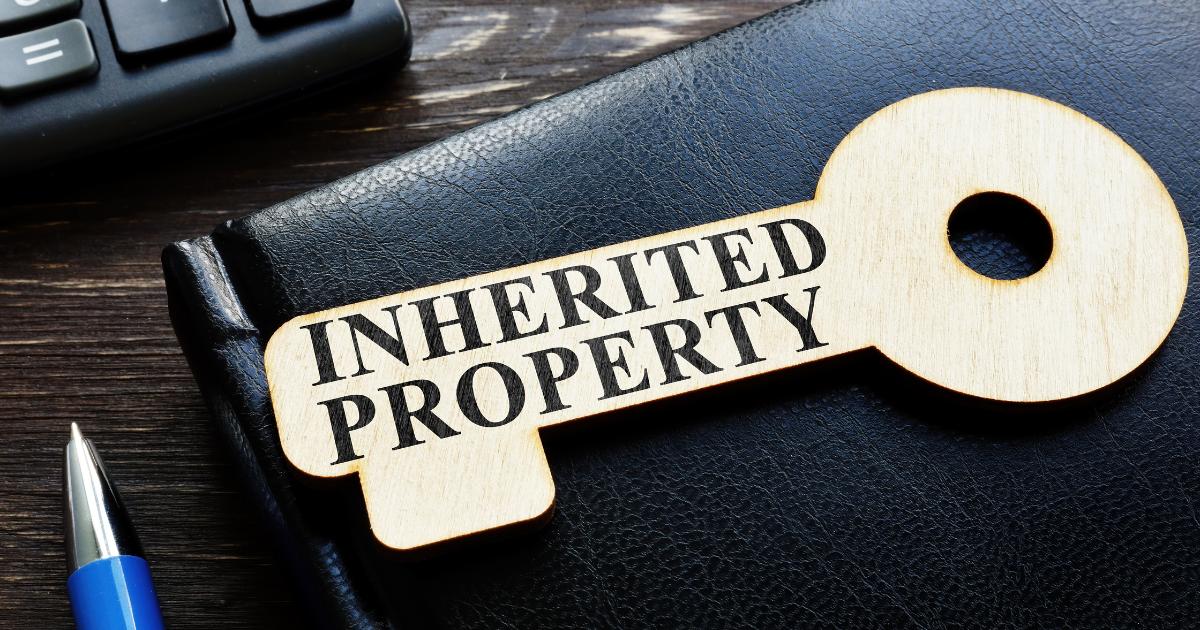· Family Dispute Resolution · 7 min read
Mediation vs. Arbitration: Which Is Best for Family Disputes?
Family disputes can be emotionally taxing, requiring careful consideration of the best resolution method. This guide explores the differences between mediation and arbitration, their benefits, and how to choose the right approach for your family's unique needs

Family disputes can be emotionally draining and complex, often involving sensitive matters that affect relationships long after the legal issues are resolved. Whether it’s a divorce, custody disagreement, or financial dispute, finding the right method to resolve family conflicts is crucial. Two common alternatives to litigation are mediation and arbitration. But how do you know which one is best for your situation? Let’s dive into the details.
What Is Mediation?
Mediation is a process in which a neutral third party, known as a mediator, facilitates discussions between the disputing parties to help them reach a mutually agreeable solution. Unlike a judge or arbitrator, a mediator doesn’t impose decisions; instead, they guide the conversation to encourage compromise.
The Role of a Mediator
The mediator listens to both sides, identifies common ground, and helps the parties come to an agreement. In family disputes, this might involve negotiating custody arrangements, dividing assets, or settling financial obligations.
How Mediation Works in Family Disputes
Family mediation sessions are typically informal and take place in a neutral setting. The goal is to resolve the conflict amicably, allowing both parties to maintain a cooperative relationship, which is especially important when children are involved.
What Is Arbitration?
Arbitration, on the other hand, is a more formal process where a third party, called an arbitrator, reviews the evidence and makes a binding decision. The arbitrator acts similarly to a judge, but arbitration is typically faster and more flexible than court proceedings.
The Role of an Arbitrator
An arbitrator listens to both sides, examines the evidence, and issues a ruling that is legally binding. This means that the decision made in arbitration can be enforced in court, just like a court judgment.
How Arbitration Works in Family Disputes
In family law arbitration, both parties agree to abide by the arbitrator’s decision. This process is often used for more complicated or high-conflict family disputes where a clear, enforceable outcome is needed quickly.
Key Differences Between Mediation and Arbitration
Understanding the key distinctions between mediation and arbitration can help you make an informed choice.
Voluntary vs. Binding
Mediation is a voluntary process where both parties work together to come to an agreement. In contrast, arbitration results in a binding decision made by the arbitrator, which the parties must adhere to.
Formality Levels
Mediation tends to be less formal, focusing on dialogue and cooperation. Arbitration is more formal, akin to a courtroom setting, where the arbitrator makes a decision based on presented evidence.
Role of Third-Party Facilitator
In mediation, the mediator facilitates conversation but doesn’t have the authority to make a final decision. In arbitration, the arbitrator has the power to make a binding ruling.
Benefits of Mediation for Family Disputes
Mediation offers several advantages, especially for families looking to resolve conflicts amicably.
Emphasis on Collaboration
Mediation encourages open communication and cooperation. This approach is particularly beneficial in family disputes where maintaining a relationship, especially for co-parenting, is a priority.
Less Stressful Environment
Because mediation is less formal and adversarial, it can be less emotionally taxing. Both parties are encouraged to voice their concerns in a safe, controlled environment.
More Control Over the Outcome
Since both parties must agree on the final resolution, mediation gives families more control over the decisions that will affect their future.
Benefits of Arbitration for Family Disputes
For families with more complex issues, arbitration may be the better choice.
Faster Decision-Making Process
Arbitration can often be completed more quickly than mediation or litigation. Since the arbitrator has the authority to make decisions, there’s no back-and-forth negotiation as in mediation.
Enforceable Rulings
The arbitrator’s decision is legally binding, making it easier to enforce in court if necessary. This can be especially helpful in high-conflict situations where a clear resolution is needed.
Suitable for Complex Cases
If a family dispute involves complicated legal or financial matters, arbitration may provide a more structured process with a definitive outcome.
Situations Where Mediation Works Best
Mediation is ideal for family disputes that require cooperation and ongoing relationships.
Co-Parenting Disagreements
Mediation is often the preferred choice for resolving custody and visitation disputes. It helps parents come to an agreement that prioritizes the best interest of their children.
Financial Disputes Without Major Legal Complications
If the financial issues in question are straightforward, such as dividing assets in a divorce, mediation can help resolve these matters efficiently and without the need for a formal ruling.
When Arbitration Is the Better Option
In some family disputes, arbitration might be the best solution.
High-Conflict Situations
When emotions run high, and parties are unable to reach an agreement through mediation, arbitration offers a quicker, enforceable solution.
Legal Complexities That Require Firm Decisions
If the dispute involves intricate legal issues, arbitration provides a structured process where the arbitrator can make decisions based on the law and evidence presented.
Cost Comparison: Mediation vs. Arbitration
How Mediation Is Generally More Affordable
Mediation is often less expensive because it doesn’t require the same level of legal preparation or expert testimony that arbitration or litigation might involve.
Arbitration Fees and the Role of Legal Experts
Arbitration can be more costly due to the need for legal representation and the arbitrator’s fees, especially in complex cases.
Time Efficiency: Mediation vs. Arbitration
How Long Each Process Usually Takes
Mediation typically involves multiple sessions over a period of weeks or months, while arbitration may be completed in one or two hearings, making it faster in some situations.
Why Arbitration Might Be Faster in Some Cases
If a family needs a quick resolution, arbitration’s more streamlined process may offer a faster outcome compared to mediation or litigation.
Emotional Impact on Families
How Mediation Helps Maintain Relationships
Mediation fosters cooperation, which can help preserve family relationships, especially for couples with children who need to co-parent effectively.
Why Arbitration Might Feel More Formal and Rigid
Arbitration, while quicker, is more formal and may feel more adversarial, which can strain relationships further.
Confidentiality in Mediation and Arbitration
Protection of Privacy in Both Processes
Both mediation and arbitration are private processes, unlike courtroom litigation, which is public.
Differences in Legal Enforceability of Confidentiality
While both processes are confidential, arbitration may have stricter enforceable confidentiality agreements due to the formal nature of the ruling.
The Legal Implications of Mediation vs. Arbitration
Enforceability of Mediation Agreements
Mediation agreements are not automatically legally binding but can be made so through court approval.
Arbitration’s Legally Binding Outcomes
In contrast, arbitration decisions are binding and enforceable in court without needing additional steps.
Choosing the Right Approach for Your Family
Every family’s needs are different, and the decision between mediation and arbitration depends on the specifics of the dispute.
Assessing Your Family’s Specific Needs
Consider factors like the need for ongoing relationships, the complexity of the dispute, and the desired level of formality when choosing between the two.
How to Make an Informed Decision
Consulting with a legal expert or family mediator can help clarify which option is best for your particular situation.
Conclusion
When it comes to family disputes, both mediation and arbitration offer viable alternatives to traditional court battles. Mediation fosters cooperation and helps maintain relationships, making it ideal for lower-conflict situations. Arbitration, on the other hand, provides a more formal, binding resolution, making it suitable for complex or high-conflict cases. The best approach depends on your family’s needs, the nature of the dispute, and the desired outcome.
FAQs
**1. Can mediation be used for all family disputes?
**Mediation works best for disputes where both parties are willing to cooperate. It may not be suitable for cases involving abuse or extreme conflict.
**2. Is arbitration always legally binding?
**Yes, arbitration rulings are binding and enforceable in court, unlike mediation agreements, which require court approval to be legally enforceable.
**3. What if mediation fails—can I still go to court?
**Yes, if mediation doesn’t lead to an agreement, parties can still take their dispute to court.
**4. Does arbitration involve going to court?
**No, arbitration is a private process, and the arbitrator’s decision is final and binding without needing a court trial.
**5. How do I find a qualified mediator or arbitrator?
**You can find qualified mediators or arbitrators through family law attorneys, online directories, or local legal aid organizations.



